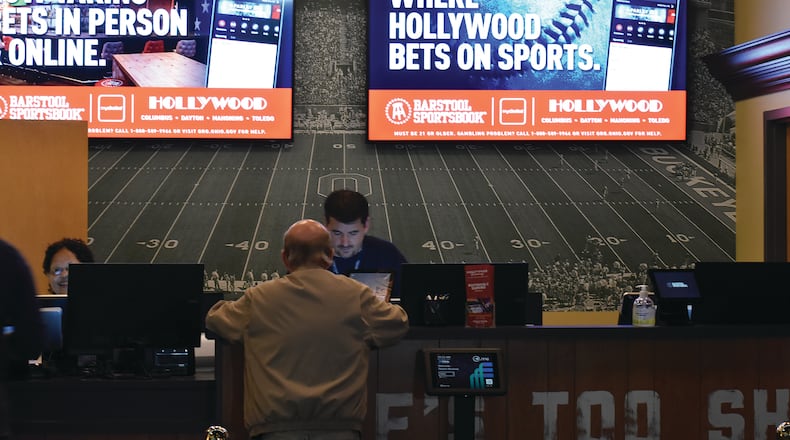“In the last few months leading up to legalized sports betting, we had seen a continued uptick,” said Derek Longmeier, executive director of Problem Gambling Network of Ohio. “It’s something that we knew was increasing and something we had been monitoring, and we also know from other states that as legal forms of gambling expand, there’s going to be increased demand on services.”
The Problem Gambling Network of Ohio expects those calls to the helpline to continue to increase, but it is unknown how high they will go.
“We continue to monitor that and will monitor that as the months progress,” Longmeier said.
A benefit to the helpline numbers increasing, Longmeier said, is that people are utilizing those resources.
“People see the helpline and are making those calls and getting resources to the help they need,” Longmeier said. “We know that once a new form of gambling is legalized, more Ohioans will engage in gambling, and as a result, more Ohioans will need help, so it’s good that we’re seeing them seek that help as well.”
The ages of the callers to the helpline were younger than they had been historically, Longmeier said. Other factors that were different included how long the individuals had been dealing with a gambling problem. Longmeier said the helpline was getting more calls from individuals who had only had issues for under a year.
Around 52% of the callers declined to give out demographic information. Montgomery and Butler counties accounted for under 2% of the calls where callers did provide demographic information, and other Dayton-region counties were under 1% of those calls. The counties with the largest demographics included Cuyahoga County at approximately 12% of the calls, along with Franklin and Hamilton counties at almost 4% each.
“Ohio has been working to raise awareness about the Problem Gambling Helpline prior to the launch of sports gaming and de-stigmatize seeking help,” said Jessica Franks, director of communications at the Ohio Casino Control Commission. “Some calls to the helpline are unrelated to seeking help, but this is still an opportunity to reach out to these individuals and let them know about the resources that are available.”
Additionally, on Wednesday, Barstool Sportsbook parent Penn Sports Interactive LLC and DraftKings accepted the fines the Ohio Casino Control Commission levied against them for advertising violations. Penn Sports will be paying $250,000, and DraftKings will be paying a total of $500,000.
“I think that’s really an important piece that sets Ohio apart from other states,” Longmeier said about holding sportsbook operators accountable for their advertisements.
Locally, Recovery Services at Public Health - Dayton and Montgomery County has not seen a large increase in demand for services, but private practices are seeing more individuals coming in with gambling concerns.
“Currently, our numbers have not increased greatly. However, we continue to anticipate an increase in numbers, and we continue to screen and educate our clients about the risk of problem gambling,” said William Roberts, senior manager of Public Health’s Recovery Services program. “One of our staff members who also has a private practice, her numbers have tripled thus far in terms of problem gambling clients, and she’s at capacity.”
This increase in demand for problem gambling help was expected by many in the recovery profession, Roberts said.
“I continue to predict it’s going to get a lot worse, especially as they continue to increase easy access and proximity to gambling. We’re down to right in your cell phone. You don’t have to leave the house,” Roberts said.
It is already difficult to detect problem gambling, so it is easy for a problem to go undetected and under the radar.
“Usually when problem gamblers have a problem, it’s gotten severe before they seek help,” Roberts said. “We’re expecting that to happen, especially the way some of these programs are advertising, giving people free bets to get them started.”
Recovery Services is free to individuals, whether they have insurance or not, to get a screening for or help with problem gambling. Recovery Services can also help connect families of individuals with a gambling problem to other resources. For more information, call 937-461-5223.
Want a time out?
The Ohio Casino Control and Ohio Lottery Commissions are offering resources where individuals choose to have themselves banned from gambling facilities in the state.
The Time Out Ohio program offers individuals the ability to ban themselves from Ohio’s casinos, Ohio racinos and Ohio sports gaming for one year, five years, or their lifetime. Once the request is validated, you are not permitted access to any Ohio casino, racino properties and to participate in Ohio sports gaming during the length of the self-imposed ban. This ban may include affiliated properties outside of Ohio.
If you are discovered at a banned facility or banned entity after enrolling in Time Out Ohio, you must surrender any money or thing of value that you convert or attempt to convert into a wagering instrument (such as jackpots, slot tickets, TITOs, chips) and any winnings gained from these. These surrendered funds will be used to fund state problem gambling and addictions services.
Those who want to participate can sign up online at timeoutohio.com.
About the Author

